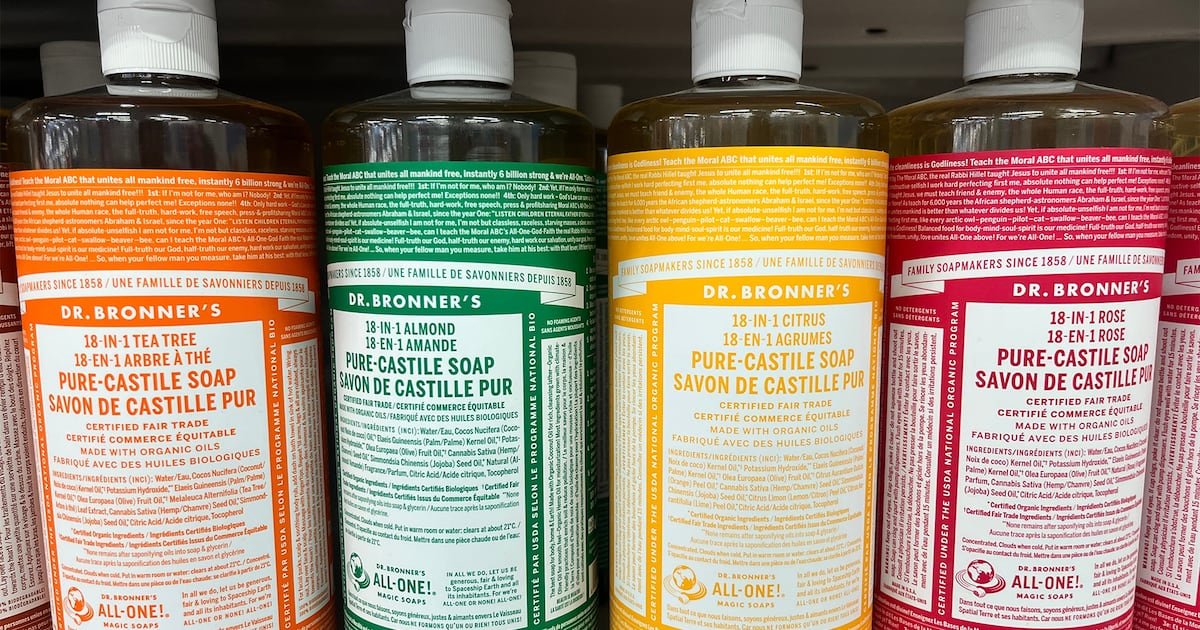
Cult soap brand Dr. Bronner’s is quitting a well-known corporate responsibility programme because its executives say the standards are too weak, marking a departure from companies watering down their goals to appease conservative activists.
The Vista, California-based brand won’t renew its B Corp certification when it expires in September after years of lobbying B Lab, the nonprofit behind the programme, for more stringent requirements, according to a statement Tuesday.
The B Corp badge signals a company’s commitments to social and environmental goals and is coveted by those looking to reel in consumers seeking out ethical products. It’s held by thousands of brands, including Patagonia, Warby Parker and Ben & Jerry’s.
Dr. Bronner’s main complaint about B Lab is that it doesn’t require corporations to prove through third-party certifications or other tests that their supply chains protect human rights and the environment. Companies can attain the certification in part by focusing on other efforts, such as providing financial security to employees and monitoring its waste output, according to B Lab’s guidelines.
That approach, Dr. Bronner’s argues, allows for greenwashing because it fails to capture the impact of large corporations with sprawling supply chains that often involve crops plagued with human rights and environmental concerns, such as palm oil. Such worries have led to backlash from B Corp members in recent years after subsidiaries of companies including Nestle SA earned the certification.
While using solar panels and having solid DEI practices is key, “for a consumer-packaged goods company, it’s got to be mostly about how your product is produced, not what you’re doing in your headquarters,” said David Bronner, who co-leads the soap maker with brother, Michael, both grandsons of founder Emanuel Bronner.
B Lab said in a statement that it vets the information by looking at supporting documents and undertaking possible site reviews. The process is more stringent for multinationals, the group said, and the certification looks at a company’s “entire social and environmental impact.”
Dr. Bronner’s separation from B Corp comes as many companies that have promised to adhere to environmental, social and governance ideals are contending with America’s culture wars, which have been exacerbated by executive orders by President Donald Trump. McDonald’s Corp., Meta Platforms Inc. and Walmart Inc., have changed or ditched some programes in recent weeks.
“There’s that tendency to go along to get along — to kiss the ring of power,” said David. But “administrations come and go. We’ll ride this moment out.”
The 77-year-old closely held brand, known for its bottles of liquid soap that it says can be used to clean everything from hair to toilets, first raised concerns publicly about B Corp’s standards in 2022 after Nestle subsidiary Nespresso obtained the certification and began marketing its badge.
Dr. Bronner’s was among the most recognised companies to join an open letter denouncing the move, citing reports documenting child labour, wage theft and abuse of factory workers. Nespresso at the time said its own investigation found three confirmed cases of child labour and pledged to rectify the issue.
Nestle said in a statement that its B Corp certification required a “rigorous” assessment covering several aspects of its business and supply chain, labour, governance and social and environmental impact. “Where there are claims that our high standards are not met, we act immediately,” the company added.
Dr. Bronner’s continued to lobby B Lab and suggest revisions to its program, according to the company’s vice president of sustainability Darcy Shiber-Knowles.
Currently, businesses are evaluated across several different areas and have to achieve at least 80 points. They can obtain the certification even if they score low in one of the areas as long as the total tallies up to the minimum threshold. At the time of its certification, Nespresso scored 84 points. Dr. Bronner’s has 206.7.
In a letter to B Lab, seen by Bloomberg News, Dr. Bronner’s proposed a tiered system that would give companies a different status based on how well they score. The brand also asked for minimum passing marks for each testing area. Dr. Bronner’s met with B Lab, while also participating in surveys and focus groups to press its case, Shiber-Knowles said.
B Lab says it will publish new standards for B Corp certification early this year, the result of several years of reviewing its requirements and responding to feedback from businesses, advocacy organisations and sustainability experts.
“B Corps are not claiming to be perfect companies; instead, they are companies willing to measure their impacts, identify opportunities for improvement and implement changes,” the group said.
Dr. Bronner’s, which generated an estimated $209 million in revenue in 2024, said it has started removing the B Corp logo from its branding and marketing materials. The company has spent $260,000 to date on certification fees since 2015 when it first earned the seal.
By Daniela Sirtori



